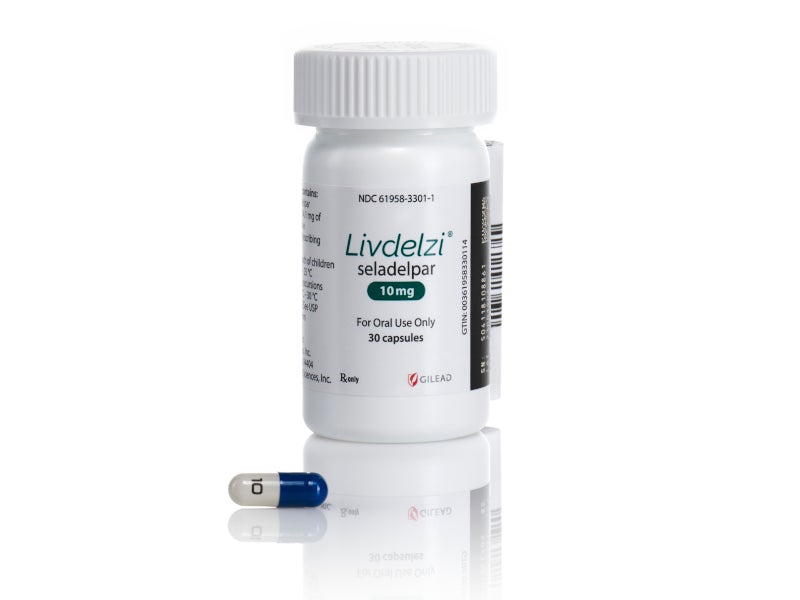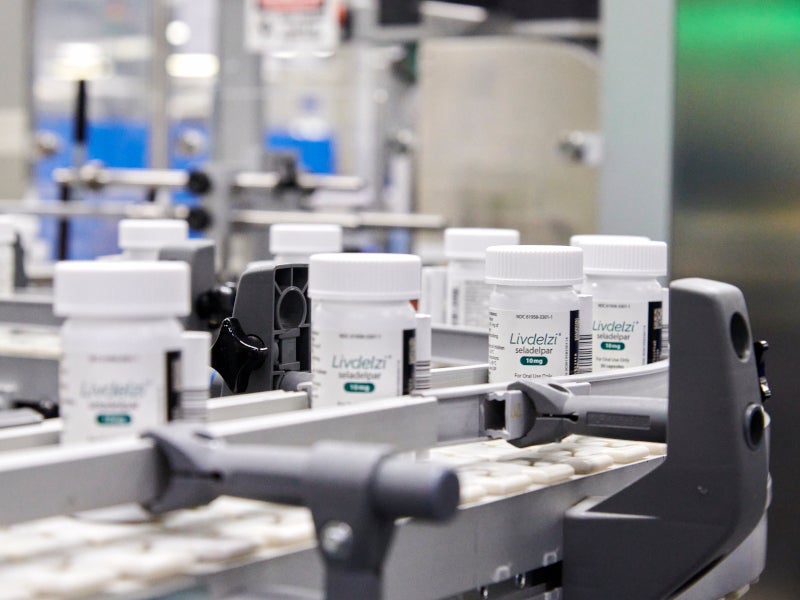Livdelzi® (seladelpar) is a novel, selective peroxisome proliferator-activated receptor delta (PPARδ) agonist. It is indicated for the treatment of primary biliary cholangitis (PBC) together with ursodeoxycholic acid (UDCA) in adults who exhibit an insufficient response to UDCA or as a sole treatment for those who are intolerant to UDCA.
Seladelpar was originally part of the drug pipeline of CymaBay Therapeutics, a US-based pharmaceutical company.
Gilead Sciences, a biopharmaceutical company based in the US, acquired CymaBay Therapeutics and expanded its liver portfolio with the addition of seladelpar in March 2024.
In August 2024, the US-based pharma company PANTHERx Rare formed a partnership with Gilead Sciences to distribute Livdelzi.
Livdelzi is available as opaque, hard gelatine capsules with 10mg dosage strength for oral administration.
Regulatory approvals for Livdelzi
The US Food and Drug Administration (FDA) granted accelerated approval for Livdelzi (seladelpar) in August 2024, following the acceptance of a new drug application (NDA) for priority review in February 2024.
The NDA was submitted by CymaBay Therapeutics in December 2023.
In October 2023, the FDA revised the breakthrough therapy designation for seladelpar, originally granted in 2019, to reflect its use in the treatment of PBC, including pruritus in adults without cirrhosis or with compensated cirrhosis scoring Child-Pugh A (a grade on the Child-Pugh scale for measuring liver function).
Seladelpar was granted with the European Medicines Agency’s (EMA) Priority Medicines (PRIME) designation for treating PBC in October 2016.
The drug holds orphan drug status in both the US and Europe. Currently, the drug is under review by the UK Medicines and Healthcare Products Regulatory Agency and the European Medicines Agency.
Primary biliary cholangitis causes and symptoms
PBC, also known as primary biliary cirrhosis, is a chronic autoimmune condition characterised by impaired bile flow, called cholestasis, and the accumulation of toxic bile acids in the liver. It leads to progressive inflammation, destruction of the liver’s bile ducts and increased levels of liver enzymes.
The main causes of PBC are genetic susceptibility and environmental factors.
In the US, around 130,000 individuals, predominantly women, are diagnosed with the disease. Without treatment, PBC can lead to severe liver damage and eventual failure.
At the time of diagnosis, many patients exhibit no symptoms. Some, however, may experience fatigue and the primary symptom, pruritus – an intense itching sensation.
Livdelzi’s mechanism of action
Seladelpar is a drug that selectively activates a receptor called PPARδ, which is important for controlling glucose, fat and cholesterol metabolism. PPARδ is found in many tissues, including the liver.
When seladelpar activates PPARδ, it reduces bile acid production by lowering the activity of an enzyme called cholesterol 7 alpha-hydroxylase-1 (CYP7A1). This enzyme normally converts cholesterol into bile acids, and the reduction is influenced by a protein called fibroblast growth factor 21 (FGF21).
Clinical trials on Livdelzi
The accelerated approval of Livdelzi was based on the outcomes of the Phase III RESPONSE study, a 12-month, double-blind, placebo-controlled clinical trial.
193 patients who were either unresponsive to or had experienced serious adverse effects from UDCA treatment, were selected and randomised to receive an oral dose of 10mg Livdelzi or a placebo once daily for 12 months.
The primary endpoint was a composite biochemical response at month 12. Key secondary endpoints included normalisation of alkaline phosphatase (ALP) levels, which is a cholestatic marker and a predictor of risk for liver transplant and death, and alterations in the pruritus numerical rating scale score from baseline at six months.
In the study, 62% of participants receiving Livdelzi reached the primary endpoint of composite biochemical response by month 12, compared to 20% of those on placebo. Additionally, 25% of participants treated with Livdelzi achieved normalised ALP levels by month 12, a result not observed in the placebo group.
Livdelzi also significantly reduced pruritus in patients compared to placebo.
In the RESPONSE study, Livdelzi, whether administered as a monotherapy or along with UDCA, orally and once daily, subsided key biomarkers of PBC and contributed to pruritus relief, marking it as the first and sole therapy to meet the benchmark.
The most frequently reported adverse events in patients were headache, abdominal pain and swelling, nausea and dizziness.
The RESPONSE study, along with other research such as the long-term open-label ASSURE study and earlier phase trials, collectively reflect Livdelzi’s effect on more than 500 participants with PBC.
Current investigations include the Phase III randomised, placebo-controlled confirmatory long-term outcomes study, AFFIRM, which aims to analyse the impact of Livdelzi on clinical outcomes in individuals with compensated cirrhosis due to PBC. Continued approval could depend on confirming clinical benefits in the confirmatory trial.






